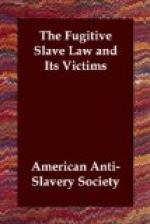offered bail was refused, and he was lodged in jail.
The case was subsequently tried before the District
Court of the United States, at Milwaukee, on
the question as to the right of a State judiciary
to release prisoners under a writ of habeas
corpus, who may be in the lawful custody of United
States officers; and also to determine the constitutionality
of the Fugitive Slave Law. (Washington Star,
September 20, 1854.) The Attorney General, Caleb
Cushing, made himself very active in pushing
forward this case. Mr. Booth, early in 1855,
was fined one thousand dollars and sentenced to one
month’s imprisonment. John Ryecraft,
for same offence, was sentenced in a fine of
two hundred dollars and imprisonment for ten
days. All for acts such as Christianity and Humanity
enjoin. On a writ of habeas corpus,
Messrs. Booth and Ryecraft were taken before
the Wisconsin Supreme Court, sitting at Madison,
and discharged from imprisonment. This, however,
did not relieve them from the fines imposed by the
United States Court. The owner of the slave
brought a civil suit against Mr. Booth, claiming
$1,000 damages for the loss of his slave.
Judge Miller decided, July, 1855, that the $1,000
must be paid.
EDWARD DAVIS, March, 1854. As the steamboat Keystone State, Captain Hardie, from Savannah, was entering Delaware Bay, bound to Philadelphia, the men engaged in heaving the lead heard a voice from under the guards of the boat, calling for help. A rope was thrown, and a man caught it and was drawn into the boat in a greatly exhausted state. He had remained in that place from the time of leaving Savannah, the water frequently sweeping over him. Some bread in his pocket was saturated with salt water and dissolved to a pulp. The captain ordered the vessel to be put in to Newcastle, Delaware, where the fugitive, hardly able to stand, was taken on shore and put in jail, to await the orders of his owner, in Savannah. DAVIS claimed to be a free man, and a native of Philadelphia, and described many localities there. Before Judge Bradford, at Newcastle, Davis’s freedom was fully proved, and he was discharged. He was again arrested and placed in jail on the oath of Captain Hardie, that he believed him to be a fugitive slave and a fugitive from justice. After some weeks’ delay, he was brought to trial before United States Commissioner Samuel Guthrie, who ordered him to be delivered up to his claimant on the ground that he was legally a slave, though free-born. It appeared in evidence that Davis had formerly gone from Pennsylvania to reside in Maryland, contrary to the laws of that State; which forbid free colored persons from other States to come there to reside; and being unable to pay the fine imposed for this offence (!) by the Orphan’s (!) Court of Harford County, was committed to jail and sold as a slave for life, by Robert McGaw, Sheriff of the County, to Dr. John G. Archer, of Louisiana, from whom he was sold to B.M. Campbell, who sold him to William A. Dean, of Macon, Georgia, the present claimant. Thus a free-born citizen of Pennsylvania was consigned, by law to slavery for life:
[—>In May, 1854, the Kansas-Nebraska Bill was enacted.]




